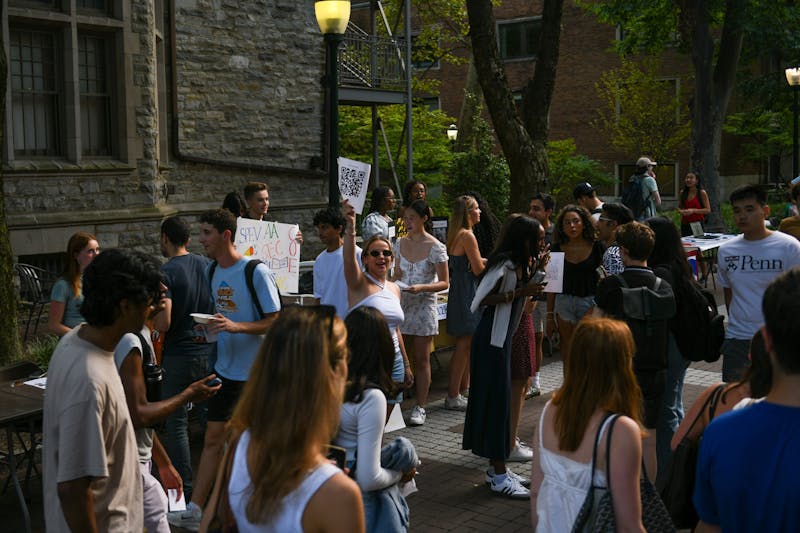When College senior Evan Olonoff came to Penn, he planned on majoring in mathematics.
However, during his freshman and sophomore years, he realized he preferred economics and political science to math, and by second semester of sophomore year, he had switched his major to politics, philosophy and economics.
“I decided that it would be more interesting,” Olonoff said. “It would help me combine my interests.”
Like Olonoff, many second-semester sophomores contemplating their majors are drawn to Penn’s interdisciplinary departments.
As these departments have grown in the past few years, students and faculty have debated their merits and disadvantages.
For some, interdisciplinary majors offer a unique opportunity to learn about a wider variety of subjects, while others believe these majors are too simplistic and not specialized enough.
Past and Present
Among its peer institutions, Penn has been at the forefront of implementing interdisciplinary majors.
“Many of the important scientific, social, political, cultural, etc. questions do not fall squarely within a traditional discipline,” Dean of the College of Arts and Sciences Dennis DeTurck wrote in an email, adding that Penn values the importance of studying “emerging fields and issues from an interdisciplinary perspective.”
In the 1940s, Penn became one of the first universities to have an international relations major, DeTurck added.
Created during World War II at a time when international diplomacy and conflict were increasingly pressing issues on the world stage, the IR major set the precedent for Penn students to apply liberal arts education to practical and current issues.
The next interdisciplinary major instituted at Penn was the history and sociology of science major.
“To understand STSC we need to go back to the 1960s,” HSS Associate Director for Undergraduate Studies Ann Norton Greene said, explaining that at this time, students wanted to look at science in a historical and sociological context. The HSS major was officially started at Penn in 1970.
In 2001, a segment of the HSS major, health and societies, broke off as an independent program, Greene said. Four years later, the original HSS undergraduate program was renamed science, technology and society.
Both HSOC and STSC “have had a steady increase of interest,” Greene said. Today, HSOC has 40 to 50 students, while the STSC major has about 150 students.
In 1978, Penn continued to pave the way in the field of interdisciplinary majors by creating one of the first undergraduate neuroscience majors, biological basis of behavior, DeTurck added. BBB incorporates the disciplines of psychology, biology and neurological sciences and “is viewed as a national model as other places work to catch up,” DeTurck wrote.
In 1996, Penn once again organized an interdisciplinary major when it formed PPE. The program was founded by Samuel Freeman, a professor of philosophy and law.
“It was supposed to be for a smaller number of students,” Freeman said. “But it took off.”
For this newest interdisciplinary major, students enroll in foundational and integrated courses in order to get a thorough education that combines the three disciplines, according to the major’s website.
Pros and Cons
The creators of the PPE major say that it allows students who are unsure about what to major in to try out different things.
“It’s a great major especially if you’re not totally decided what you want to do,” Olonoff said. “It gives you opportunity to explore.”
However, some say that the breadth of these interdisciplinary majors such as PPE prevents students from specializing in one area.
In 2005, when Cristina Bicchieri took over as director of PPE, students were “not particularly satisfied” with the nine entry-level courses required for the major, Bicchieri said.
Instead of introductory classes in the three separate disciplines, “students wanted more interdisciplinary courses,” Bicchieri said. She added four required courses with interdisciplinary components — Strategic Reasoning, Public Policy Process, Behavioral Economics and Psychology and Philosophy of Social Science — and reduced the number of basic courses the students had to take.
Even with these renovations, some students still feel that PPE is too broad a major.
College sophomore Sam Gersten was once considering majoring in PPE, but has since switched to political science, since he felt that he was getting “far too much introduction but no actual skill set or comprehensive education in a subject matter.”
“I don’t feel like it specialized in anything,” Gersten said, adding that, “the core turned me away a little.”
Other students, such as College junior Gina Raijman, say that the major gives them a solid foundation in each of the three fields.
“I like the structure that the four required core classes provide,” Raijman added, explaining that she has room to concentrate in her area of interest — ethics and the professions.
College junior Ashleigh Taylor agreed that the PPE major is not overly broad, explaining that the four core requirements distinguish PPE as an interdisciplinary major.
“I know a lot of people think PPE is just a triple minor and not a major,” Taylor said. “But the core really makes it a major.”
College sophomore and PPE major David Berk recognizes that PPE “is a broad major,” but for him, “that’s the nature of liberal arts education.”
“It is intended to be a non-specialized major,” Freeman added. “It’s not a major for people going into academia.”
According to PPE Assistant Professor Jason Dana, a PPE major is beneficial when looking for employment. “PPE majors are well-rounded and can speak intelligently about a number of different topics,” Dana said. “That’s not a bad thing when you enter the job market.”
“It’s an interesting major to talk about in interviews,” agreed Olonoff, who will be working as an asset manager at J.P. Morgan next year. “It gives you something to talk about.”
The Future
The practical advantages of interdisciplinary majors such as PPE compel most faculty and staff to predict that they will continue to have a growing presence at Penn.
In the PPE program, Bicchieri said that she is working on a master’s program. Similarly, in STSC, Greene explained that the “curriculum will be changing” and a new array of classes will be offered when more faculty members are hired.
DeTurck wrote Penn will “soon have a new major in mathematical economics” that would prepare students who plan to pursue graduate economics programs.
Some economics majors, such as College sophomore Owen Gantz, would find this kind of interdisciplinary major appealing.
“Taking Econ 101 has made me realize the mathematical rigor that is required for economics,” Gantz said. “I think a major that looked at the theoretical and mathematical parts of econ would be a really interesting and insightful way to examine consumer preferences and economic choices.”
Taylor believes that interdisciplinary majors force students to “use their brains in different ways.”
“It teaches you to look at a problem in three or four ways,” she said. Greene agreed that interdisciplinary majors have a promising future at Penn.
“Disciplines used to have more distinct boundaries,” Greene said. “They are becoming more porous.”
The Daily Pennsylvanian is an independent, student-run newspaper. Please consider making a donation to support the coverage that shapes the University. Your generosity ensures a future of strong journalism at Penn.
DonatePlease note All comments are eligible for publication in The Daily Pennsylvanian.







